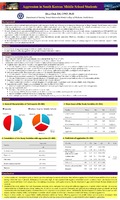| dc.description.abstract | <p><strong>Purpose:</strong> Aggressiveness is a behavioral and emotional response made on purpose for the sake of destroying or damaging other persons or things (Kim & Kim, 2007). Currently South Korean society suffers from violent and inhuman juvenile crimes like collective bullying and school violence that are due to aggressiveness (Hwang, 2010). Juvenile violence due to aggressiveness in South Korean society is not just a current issue. Seven out of 10 cases of juvenile violence occurring between 2008 and 2010 were committed by middle school students, and 69% of school violence cases occurred in middle schools (Bae, Kim, Chung, Kang, & Park, 2010). Considering these data, more attention should be dedicated to studying aggressiveness in middle school students who are in early adolescence. Previous studies have attempted to clarify various factors that influence juvenile aggressiveness. Otherwise, concentrated re-investigation is necessary to reveal factors influencing Korean middle school students' aggression. In this study depression and academic stress as negative emotional aspects, and self-esteem, decision-making competency, happiness as positive emotional aspect of middle school students were investigated specifically. In conclusion, the purpose of this study was to assess levels of aggressiveness, and to determine factors affecting aggressiveness among South Korean middle school students.</p>
<p><strong>Methods:</strong> A descriptive study was conducted using self-report questionnaires. The participants were 340 girls and boys from two middle schools and 302 questionnaires were used for the final data analysis. Aggressiveness was measured with the 'Aggression Questionnaire' developed by Buss & Perry (1992) and used in Shin's study (2000). It consists with 24 questions (5-point Likert scale) including physical aggression, verbal aggression, anger and hostility. Higher average scores correspond to higher levels of aggressiveness. Academic stress was measured with the 'Academic Stress Questionnaire' developed by Lee (2007), and it was developed to assess of middle school students' academic stress reflecting the educational environment of Korea. The measurement consisted with 25 items (5-point Likert scale) assessing perceived pressure from examinations, conflicts between family and friends related to academic performance and burden in relation to scores and class. Higher average scores correspond to higher levels of academic stress. Depression was measured with a 13-question checklist (5-point Likert scale) to evaluate depression, taken from the 'Symptom Checklist-90-Revision' revised by Kim, Kim, & Won (1984). Higher average scores indicate higher levels of depression. Scores above 70 percent of the measured score (above 3.5 out of 5.0) indicate that the person is depressed. Self-esteem was measured with the 'Self-esteem Scale' developed by Rogenberg (1965) and translated to Korean by Jeon (1974). It includes a 4-point Likert scale with a total of 10 questions to measure the levels of self-esteem and emotional aspects of self-approval. Higher average scores indicate higher levels of self-esteem. Decision-making competency was measured with the 'Decision-Making-Competency Inventory' developed by Miller and Byrnes (2001) and translated to Korean by Park et al. (2012). It includes a 5-point Likert scale with a total 18 questions to measure informed decisions, self-appraisal, autonomy, self-confidence. Higher average scores correspond with better decision-making abilities. Happiness was measured by the question 'do you think you are living happily now?' with a 5-point Likert scale. Higher scores indicated higher levels of happiness. Data were analyzed using descriptive statistics including t-test, one-way ANOVA, Pearson correlation coefficient and multiple regressions.</p>
<p><strong>Results:</strong> Mean score for participants' aggressiveness was 2.49 out of 5. Academic stress was 3.38 out of 5, for self-esteem, 2.86 out of 4, for decision-making competency, 3.2 out of 5, and for happiness, 3.82 out of 5. Depression was 2.56 out of 5 that it was lower than 3.5 indicating depression. Significant explanatory variables for aggressiveness were grade, second grader (t = 4.39, p < .001), academic stress (t = 2.78, p = .006), and depression (t = 5.03, p < .001). The explanatory power of these factors was 26.9%, and it was statistically significant (F = 16.06, p < .001).</p>
<p><strong>Conclusion:</strong> Findings indicate that depression, academic stress, and grade (second graders) influence aggressiveness. To decrease aggressive behavior, it is necessary to provide systematic and political programs in schools and local communities that can ameliorate negative emotional factors like depression and academic stress, especially for second grade middle school students. Additionally, development of positive factors such as self-esteem, decision-making skills, and happiness in middle school students is important to reduce aggressiveness.</p> | en |





